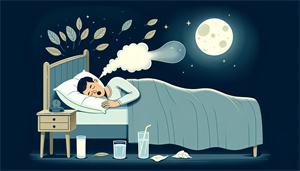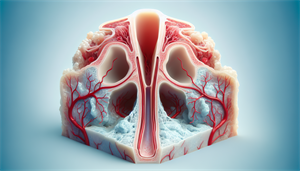Athletes with sleep apnea face an often unseen hurdle that can drastically impact their performance and overall health.
This article unpacks the silent challenge many athletes confront, showcasing both the severity of sleep apnea’s effects and the powerful ways in which these sports professionals tackle the condition to maintain their competitive edge.
Key Takeaways
-
Sleep apnea, especially obstructive sleep apnea (OSA), is prevalent among athletes due to factors such as obesity and certain genetic predispositions, and it is highly common in sports such as American football.
-
Notable athletes like Shaquille O’Neal and Reggie White have dealt with sleep apnea, which has significant implications for athletic performance including sleep deprivation and increased risk of injuries due to fatigue and cognitive impairments.
-
Apart from medical treatments like CPAP therapy, athletes can manage sleep apnea and improve overall performance by practicing good sleep hygiene and maintaining a healthy lifestyle that includes regular exercise and balanced nutrition.
The Prevalence of Sleep Apnea in Athletes
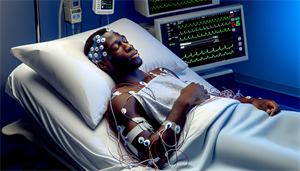
Sleep apnea, a disorder marked by frequent disruptions in breathing during sleep, is quite prevalent. It’s not an elite club that anyone strives to be a part of, but many athletes, especially those in sports like football, have unwittingly found themselves a part of it. Approximately one in three NFL players are affected by sleep apnea, and even among retired football players, the prevalence of sleep disordered breathing is as high as 60%.
What factors make athletes prone to sleep apnea? The answer lies in the nature of the most prevalent form of this disorder: Obstructive Sleep Apnea (OSA).
Obstructive Sleep Apnea
Obstructive Sleep Apnea (OSA), the most prevalent form of sleep apnea, involves repeated partial or complete airway blockage during sleep. What typically causes these blockages? Conditions that obstruct airflow through the upper airways during sleep, such as the backward movement of the tongue and the presence of excess weight and obesity.
Such a medical condition, known as a common sleep disorder, is often diagnosed through an overnight sleep study, or nocturnal polysomnography, a test that monitors heart, lung, and brain activity, as well as breathing patterns during sleep. The treatment for this sleep disorder ranges from the use of oral appliances to positional therapy and even CPAP (Continuous Positive Airway Pressure). Recognizing the risk factors is the first step in managing OSA.
Sleep Apnea Risk Factors for Athletes
Obesity, a common risk factor, significantly increases the likelihood of sleep apnea in athletes. However, weight isn’t the only factor to consider. Genetic factors play a significant role in the development of OSA, with both OSA and its severity having a heritable component.
Furthermore, certain sports pose a higher risk for the development of sleep apnea. American football players, contact sports athletes, and sumo wrestlers have all been found to be at an increased risk of developing athletes sleep apnea. It is also important to note that women develop sleep apnea, although the prevalence may vary depending on various factors.
This leads us to wonder, how do athletes manage this condition?
Notable Athletes Confronting Sleep Apnea
A number of well-known athletes have bravely faced their sleep apnea diagnosis and have taken steps to manage it. Some of the prominent names who have not only decided to seek treatment but have also publicly shared their experiences include:
-
Shaquille O’Neal
-
Reggie White
-
Warren Sapp
-
Percy Harvin
Their stories provide a glimpse into the real-life impact of sleep apnea on athletes.
Shaquille O'Neal
Shaquille O’Neal, a retired NBA player, is among the famous athletes who have been diagnosed with sleep apnea. He was found to stop breathing 72 times per hour, a symptom indicative of sleep apnea. Rather than letting the disorder dictate his life, Shaq actively sought ways to control it.
As a sleep apnea sufferer, he sought specific treatments, including treating sleep apnea with an oral appliance and therapy involving consistent air pressure, demonstrating how athletes can actively manage their condition.
Reggie White
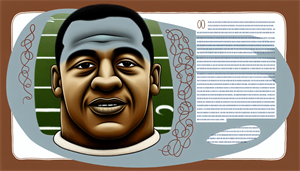
Reggie White’s experience, on the other hand, starkly illustrates the possible severity of sleep apnea if left untreated. The former NFL player’s career and overall health were significantly affected by sleep apnea, ultimately leading to the end of his career and poor sleep quality.
White’s untimely demise due to conditions related to sleep apnea led to the establishment of the Reggie White Foundation. This foundation aims to raise awareness about sleep apnea, with Sara White actively promoting men to undergo screening for this condition.
Other Athletes
Apart from these well-known names, other athletes have also publicly disclosed their battles with sleep apnea. Percy Harvin, a football player renowned for his speed and agility, has seen his career significantly impacted by sleep apnea, which has led to chronic migraine problems and other health issues. Anthony Bennett, a former top NBA draft selection, too, has had his career negatively affected by sleep apnea, as the condition, along with asthma, has potentially impacted his performance on the court. Additionally, former NFL player Brett Farve struggles with sleep apnea.
These examples illustrate the widespread impact of sleep apnea across various sports and the need for early diagnosis and proper management of this condition.
The Impact of Sleep Apnea on Athletic Performance
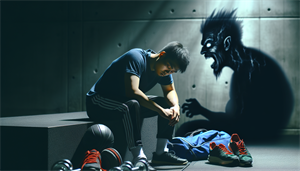
Sleep apnea can significantly affect athletic performance. Due to the disorder, athletes may experience:
-
Sleep deprivation
-
Decreased reaction time
-
Decreased motivation
-
Decreased cognitive function
-
Increased risk of injury due to fatigue, cognitive impairments, and decreased alertness.
Let’s further explore these effects.
Sleep Deprivation
Sleep apnea directly leads to sleep deprivation. It can significantly impair cognitive performance in athletes, resulting in:
-
Reduced alertness
-
Inhibited response
-
Compromised decision making
-
Impaired divergent thinking
-
Decreased working memory
All these factors can significantly impact an athlete’s performance on the field.
Moreover, sleep deprivation can:
-
Slow down responses
-
Impair judgement
-
Elevate the risk of injuries
-
Adversely affect endurance performance in sports by impacting motivation and altering motor coordination, both essential for prolonged periods of physical activity.
Injury Prevention
Fatigue and cognitive impairments resulting from disrupted sleep increase the risk of injury in athletes with sleep apnea. Furthermore, recovery from injuries may take longer in athletes with sleep apnea, as decreased oxygen levels can impact the healing process.
The sleep apnea affect can lead to various consequences, such as:
-
chronic fatigue
-
reduced energy levels
-
decreased endurance
-
impaired reaction time
can significantly impact an athlete’s coordination and reflexes, potentially leading to a higher risk of accidents and performance-related injuries. This highlights the importance of early diagnosis and treatment of sleep apnea in athletes.
Seeking Treatment and Raising Awareness
Even with these challenges, athletes with sleep apnea have reasons to be hopeful. Treatments are available, and many athletes who have been diagnosed with the disorder are raising awareness about its impact and the importance of seeking help.
Continuous Positive Airway Pressure (CPAP) therapy is one such treatment for high blood pressure.
CPAP Therapy
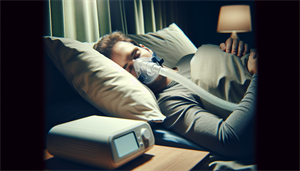
CPAP therapy is an established treatment for sleep apnea. It works by:
-
Maintaining a positive end-expiratory pressure (PEEP)
-
Reducing atelectasis
-
Enhancing the surface area of the alveolus
-
Improving ventilation/perfusion (V/Q) matching
-
Preventing the collapse of the upper airway.
CPAP therapy can induce significant changes in athletes, including:
-
Reducing apnea episodes during sleep, allowing for a deeper and more restful sleep
-
Improved endurance
-
Better reaction times
-
Enhanced cognitive function, all crucial for athletic performance
Athletes like JaMarcus Russell have effectively managed their sleep apnea through CPAP therapy, employing a ComfortGel Blue Full Mask System.
Athletes as Advocates
Athletes are not only seeking treatment for sleep apnea, but they are also instrumental in increasing awareness about the condition. By sharing their personal experiences, they are inspiring others to pursue treatment.
Some well-known professional athletes include:
-
Shaquille O’Neal
-
Roy Green
-
Larry Fitzgerald
-
Seth Joyner
-
Derek Kennard
-
Alfonso Smith
-
Mark Walczak
They have been involved in the sleep apnea prevention project, raising awareness about sleep apnea and demonstrating their dedication to the cause. Their advocacy can profoundly raise awareness of the condition, leading to an improved public understanding of sleep apnea and its consequences.
Tips for Athletes to Improve Sleep Quality
Aside from medical treatments, athletes can enhance their sleep quality and manage sleep apnea through good sleep hygiene and a healthy lifestyle.
Sleep Hygiene
Sleep hygiene involves a set of behavioral and environmental practices that promote healthy sleep patterns, such as maintaining a conducive bedroom environment and consistent daily routines to support uninterrupted sleep. For athletes, it contributes to improved sleep quality and overall performance by aiding in better recovery and cognitive functions.
Furthermore, athletes need to maintain a regular sleep schedule. It can enhance sleep quality by increasing both the quantity and quality of sleep, leading to improvements in performance across various aspects related to the demands of the sport, such as memory consolidation and decision-making.
To establish a conducive sleep environment, athletes can:
-
Abstain from stimulants such as alcohol and caffeine before bedtime
-
Refrain from using electronic devices before sleep
-
Ensure the sleeping area is tranquil and cool
-
Contemplate the use of white noise for managing noise levels.
By following these tips, athletes can optimize their sleep and improve their performance.
Exercise and Nutrition
Physical activity and balanced nutrition also significantly contribute to the management of sleep apnea. Here are some ways in which physical activity can help:
-
Promotes upper airway muscle activation
-
Increases upper airway diameter
-
Reduces airway resistance
-
Opposes pharyngeal collapse during sleep
-
Aids in weight loss
-
Decreases abdominal fat
All of these factors are important for lessening the severity of sleep apnea in athletes.
Maintaining a healthy weight is paramount since overweight is a major risk factor for sleep apnea. This underscores the critical need for athletes to effectively manage their weight. A diet that can aid in the prevention of sleep apnea includes:
-
Foods rich in antioxidants
-
Green tea
-
Honey
-
Foods with melatonin
-
Omega-3 fatty acids
-
Low-fat dairy
-
Whole grains
Summary
In conclusion, sleep apnea is a common yet often overlooked condition among athletes. Its prevalence in this population, coupled with its potential to negatively impact performance and increase the risk of injury, makes it crucial for athletes to be aware of this disorder. Thankfully, with early detection, proper management, and the adoption of good sleep hygiene, athletes can continue to excel in their sports while keeping sleep apnea in check.
Frequently Asked Questions
Can you be an athlete with sleep apnea?
Athletes with sleep apnea may experience longer reaction times, fatigue, loss of balance, and inadequate concentration, which can impact their performance during games or competitions and potentially lead to injuries.
What sports stars have sleep apnea?
Several sports stars, such as Reggie Jackson, Percy Harvin, JaMarcus Russell, Tony Dorsett, Warren Sapp, and Aaron Taylor, have been diagnosed with sleep apnea, which was a contributing factor in Reggie Jackson's death.
Does Shaq still have sleep apnea?
Yes, Shaq still has sleep apnea and has been fitted with a CPAP mask to manage it.
Can you be in good shape and have sleep apnea?
Yes, it is possible for a slim and fit person to experience sleep apnea. Regular exercise and good physical condition do not guarantee protection against this condition.
